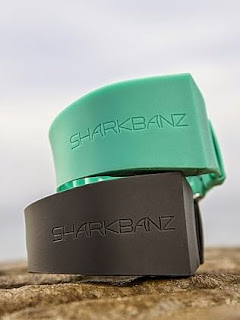Five ways you can use technology to avoid getting eaten by a shark
The easiest way to
avoid getting eaten by a shark is to simply take up an indoor sport, like ping
pong or chess. But for some people, the call of the ocean is too strong!
Here are five options
to take your shark-avoidance strategy high-tech:
The purpose of the
wetsuit is to also create disruptive coloration, which makes the wearer blend
into the background while underwater. Plus, it’ll make the wearer hopefully
appear unlike shark food!
Please note: SAMS does
not guarantee that you will not get eaten while wearing this suit, so you may
need a backup plan to stay safe!
Apparently the
wristband uses patented magnetic technology to keep sharks away from vulnerable
swimmers. The band disrupts the shark’s electro-receptors and that then deters
sharks from coming closer to get a taste.
Like the wetsuit
before, the Sharkbanz wristband can’t be 100% guaranteed!
Shark Shield makes
packs that can be attached to anything from surfboards and kayaks to your
ankles or wrists. The shield creates a three dimensional electronic field
around the swimmer or surfer that is intended to discomfort the shark and chase
them away.
OCEARCH’s Global Shark
Tracker is one app that lets you track the global movements of sharks that have
been tagged by non-profit organisations. Although the main aim of the data is
not for paranoid to keep track of sharks whereabouts, the information in real
time is fantastic.
 Researchers here in
Cape Town, South Africa have been trying out cable technology since late 2014. The
100 metre long cable is meant to ward off sharks by emitting a low frequency
pulsed electronic signal that will hopefully prove too much for the shark’s
sensitive nose.
Researchers here in
Cape Town, South Africa have been trying out cable technology since late 2014. The
100 metre long cable is meant to ward off sharks by emitting a low frequency
pulsed electronic signal that will hopefully prove too much for the shark’s
sensitive nose.
In the end, you might
just want to follow the most basic rules to avoid getting eaten, like don’t swim
at night and leave the water if fish school is in high numbers.
If simple rules are
not your thing, you are probably going to need a bigger and more high-tech
boat!
For all your IT services, make sure to contact The Computer Guyz in Cape Town or Centurion. No, we don't have any shark-repelling gizmos, but we can offer you anything from general IT support and repairs to graphic design and website hosting.
Written By: Christine Romans
CopyWriter at The Computer Guyz Cape Town


Comments
Post a Comment